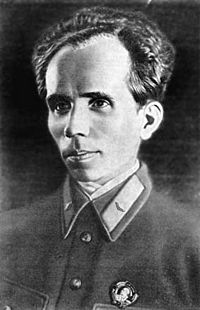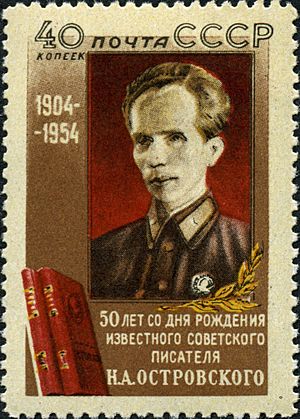Nikolai Ostrovsky facts for kids
Quick facts for kids
Nikolai Alexeevich Ostrovsky
|
|
|---|---|

Nikolai Ostrovsky
|
|
| Born | 29 September 1904 Viliya, Ostrozhsky Uyezd, Volhynian Governorate, Russian Empire |
| Died | 22 December 1936 (aged 32) Moscow, Russian SFSR, Soviet Union |
| Resting place | Novodevichy Cemetery, Moscow |
| Occupation | Novelist, Chekist, Communist Party member |
| Language | Russian language |
| Nationality | Ukrainian |
| Alma mater | Sverdlov Communist University |
| Genre | Socialist Realist |
| Notable works | How the Steel Was Tempered |
| Spouse | Raisa Porfyrivna (nee Motsyuk) |
Nikolai Alexeevich Ostrovsky (Russian: Никола́й Алексе́евич Остро́вский; Ukrainian: Мико́ла Олексі́йович Остро́вський; September 29, 1904 – December 22, 1936) was a writer from the Soviet Union. He was of Ukrainian background. He is most famous for his book called How the Steel Was Tempered. This book is about a young man's dedication to his beliefs.
Contents
Early Life and Challenges
Nikolai Ostrovsky was born in a village called Viliya. This village was in what is now Rivne Oblast in Ukraine. His family was working-class. He went to a local school and was a very good student until he was nine years old.
In 1914, when he was ten, his family moved to a railroad town named Shepetivka. Here, Nikolai started working to help his family. He worked in kitchens, a timber yard, and later became an electrician at a power station.
Joining the Revolution
When he was 13, in 1917, Nikolai became involved in the Bolshevik movement. The Bolsheviks were a group that wanted to change Russia's government. He joined the Komsomol in July 1918. The Komsomol was a youth organization linked to the Communist Party. In August, he joined the Red Army, which was the army of the new Soviet government.
Nikolai served in the cavalry. In 1920, he was hurt near Lviv and also got typhus, a serious illness. He went back to the army but was wounded again. Because of his injuries and illness, he had to leave the army.
Battling Illness
After leaving the army, Nikolai worked as an electrician in Kiev. He also served as a Komsomol secretary. However, his health was getting worse. He had rheumatism and the effects of typhus. In 1922, he was declared an invalid, meaning he had a serious disability. Despite this, he kept working.
He continued to be active in the Communist Party. In 1924, he officially joined the Communist Party. By 1925, his health was declining very fast. He went for medical treatment and to a special sanatorium. By December 1926, a condition called polyarthritis made it very hard for him to move. He became almost completely bedridden.
Becoming a Writer
Even though he could barely move, Nikolai did not give up. In 1927, he started a correspondence course from the Sverdlov Communist University in Moscow. He finished his studies in 1929. In August of that year, he lost his eyesight completely.
Despite being unable to move and blind, Nikolai started writing his first novel in 1930. This book was called How the Steel Was Tempered. It became very famous and important in the Communist world. The story is about a young man named Pavel Korchagin who faces many challenges but stays strong and dedicated to his beliefs.
Nikolai also wrote articles for newspapers and magazines. He often spoke on the radio. In 1934, he joined the USSR Union of Writers. In 1935, he received a high award called the Order of Lenin.
Nikolai Ostrovsky died on December 22, 1936, when he was only 32 years old. He had suffered for many years from his illness and blindness. He was working on his second novel, Born of the Storm, about the Russian Civil War in Ukraine, but he could not finish it.
Legacy and Influence
Nikolai Ostrovsky's novel How the Steel Was Tempered is still seen as one of the most important books of Communist literature. It inspired many people to be strong and dedicated.
During the time of the Soviet Union, museums and centers were built in Moscow to honor him. These places showed his study and bedroom. They also featured the achievements of other people with disabilities.
There was also a special award called the Ostrovsky Republican Prize.
After the Soviet Union ended, Ukraine passed laws to remove symbols and names from the Communist era. These are called Ukrainian decommunization laws. Because of these laws, places named after Ostrovsky have been renamed. For example, a park in Kyiv that was named after him is now called Mykola Zerov Park. A monument to him in Shepetivka was also taken down in 2022.
See also
 In Spanish: Nikolái Ostrovski para niños
In Spanish: Nikolái Ostrovski para niños
 | Leon Lynch |
 | Milton P. Webster |
 | Ferdinand Smith |


